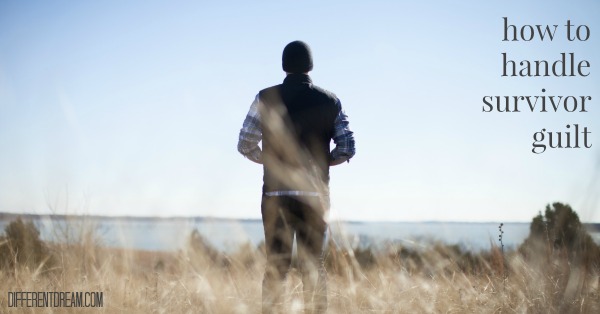Survivor Guilt and Parents of Kids with Special Needs, Pt. 2

Yesterday, guest blogger Kathy Guzzo defined it and described her experiences with it in Part 1 of Survivor Guilt and Parents of Kids with Special Needs. Today in Part 2, she explains the negative effects of survivor guilt and how she moved from guilt to gratitude.
Survivor Guilt and Parents of Kids with Special Needs, Part 2: How Guilt Affects Us
I’ve been thinking a lot about this topic recently, because I feel guilty that our 28-year-old daughter who suffers from lupus and other complications is doing remarkably well right now, while a friend’s 25-year-old son is preparing to undergo a very unexpected, serious, and complicated brain surgery. However, through much contemplation and prayer, I’ve realized the error in my thoughts.
How Survivor Guilt Affects Us
First, I’ve learned that when we take on guilt, we’re saying we are responsible and are blaming ourselves for whatever event had occurred. Looking back on the few examples I mentioned above, I wasn’t responsible for the death of our friends’ son or their pain. Also, there is no logical reason for me to blame myself for the illnesses and the actions of other children and the anguish it causes their parents.
Secondly, I’ve learned that feeling guilty about a situation which occurred to someone else changes the focus from being about those directly affected to myself. My thoughts should be on how I can encourage and help those that are suffering, not on how bad I feel because my life is going okay at that moment.
From Guilt to Gratitude
Third and most importantly, I realized that by focusing on how guilty I feel because I may have said to myself, “I’m glad it wasn’t me,” or because at times I feel joy while a friend agonizes, I’m taking away the awe and wonder of the blessings God bestows on me every day.
Instead of feeling guilt, I need to shout inwardly “Thank you God, for my undeserved blessings!” I should be using the incident to wake me up to all that God has given me. Each day my child is healthy or having a good day, each time I speak with them, or spend time with them, or they make a good decision, I need to be thankful.
Of course, I’m not going to rub my blessings in my friends’ faces, but I can use my sense of hope, and love to encourage them, to share in their pain. Because remorse means to experience sorrow or regret. I shouldn’t be remorseful that the tragedy didn’t occur to me, which results in ‘survivor’s guilt.’ However, I should feel sorrow and regret that it happened to anyone.
So what I should experience emotionally when something sad happens to others is what I will call ‘friend’s remorse,’ because to care, I must be their friend and I truly am sorrowful when anything that hurts a friend occurs. By practicing ‘friend’s remorse’ I will be able to acknowledge my blessings while empathizing, supporting and encouraging those around me.
How Do You Handle Survivor Guilt?
Kathy found gratitude to be an effective antidote against the negative effects of survivor’s guilt. How about you? How do you combat those nasty whispers in your head? What are your current struggles? How do you want to change? Leave a comment if you wish.
Survivor Guilt and Parents of Kids with Special Needs, Part 1
Do you like what you see at DifferentDream.com? You can receive more great content by subscribing to the quarterly Different Dream newsletter and signing up for the daily RSS feed delivered to your email inbox. You can sign up for the first in the pop-up box and the second at the bottom of this page.

By Kathy Guzzo
Subscribe for Updates from Jolene
Related Posts
Jesus Loves Me This I Know
Mark Arnold takes comfort and encouragement from his son’s rendition of “Jesus Loves Me,” which has been shared with so many.
Greater Love for Caregiving Parents
Karen Wright explains how her own grief about her son’s disability has created in her a greater love for caregiving parents.
Does God Speak Dutch?
Guest Blogger Steve Harris ties a favorite Christmas movie to a favorite poem to bring encouragement to special needs parents.






0 Comments